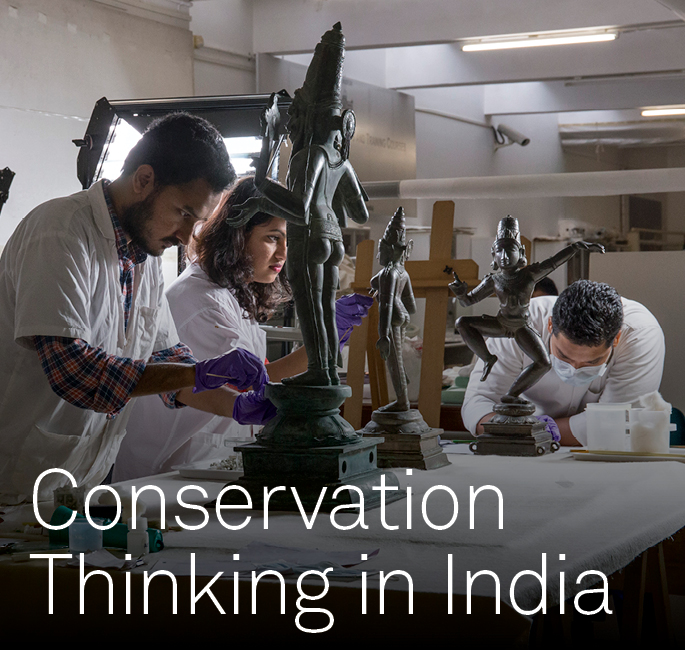|
|

|
|
|
Conservation Thinking in India convenes scholars from India and the United States to explore different approaches to conserving Indian cultural heritage. Topics will include historical practices of conservation and their combination with those of Western and other cultures, the conservation of historic buildings, the complexities of conserving historic cities, archaeological reconstructions at the Taj Mahal and questions of authenticity, the idea of the traditional craftsman in the context of Himalayan Buddhist art conservation, people in South India who conserve monuments to restore them to worship and the tensions this creates with conservation ideas, how ecologists and geologists think about the past differently from historians, and microhistories of conservation across Indian Southeast Asia.
Conservation Thinking in India is the second of two days of symposia to focus on the robust and distinctive conservation traditions of Japan and India. When launching Cultures of Conservation in 2012 BGC hoped to foster a dialogue between the field of conservation and scholars of the human sciences and bridge the gulf generated by institutional divisions and the inevitable self-siloing of successful research agendas. The associated research project, “Conserving Active Matter,” then taught us that the ways in which we conceive of “conservation,” like the ways we think about “matter” and “activity,” reflect the shape of European and then Euro-American institutional and intellectual history. The working group on Indigenous ontologies of matter made us aware that the Euro-American model described but one set of possibilities. A recognition that the conservation worlds of India and Japan operate differently reinforced our discovery of the provincialness of Western conservation thinking, regardless of how globalized it has become. As Cultures of Conservation comes to an end, we launch exploratory probes into these different conservation worlds in the hope of reshaping an understanding of conservation as a human science.
Conservation Thinking in India and Conservation Thinking in Japan are being held in conjunction with the current exhibition, Conserving Active Matter (March 25–July 10). It is the concluding event in Cultures of Conservation, a ten-year initiative largely funded by The Andrew W. Mellon Foundation, and dedicated to modeling a cross-disciplinary conversation between conservators, conservation scientists, and humanists.

Saturday, May 7, 9 am–5:45 pm
38 West 86th Street, Lecture Hall / Zoom

|
|
|
|
9 am
Peter N. Miller (Bard Graduate Center)
Welcome and Introduction
9:10 am
Binumol Tom (Rajiv Gandhi Institute of Technology, Government Engineering College, Kottayam, Kerala)
“Jiirnnoddharana: The Hindu Philosophy of Conservation”
9:50 am
Navin Piplani (Sushant University, Gurugram, Haryana)
“Resurrection of the Mehtab Bagh: The Moonlit Garden of Taj Mahal, Agra”
10:30 am
Coffee Break
10:50 am
Kulbhushan Jain (CEPT University, Ahmedabad, Emeritus)
“Complexities of Conserving Historic Cities: A Case of Jaisalmer, India”
11:30 am
Kavita Singh (Jawaharlal Nehru University, New Delhi)
“Vernacular Conservation in Rural South India: Where Worship, Secularization, and Science Collide”
12:10 pm
Lunch Break
1:30 pm
Anupam Sah (CSMVS Museum, Mumbai)
“The Art Conservation Arc in India”
2:10 pm
A.G. Krishna Menon (Independent Scholar)
“The Rationale for an Indian Charter to Conserve the Built Heritage”
2:50 pm
Sanjay Dhar (Indira Gandhi National Center for Arts, New Delhi)
“Tradition and Modernity: The Care of Buddhist Material Heritage in the Himalayan Region”
3:30 pm
Coffee Break
3:50 pm
Vinod Daniel (AusHeritage; International Council of Museums)
“Cultural Conservation: A Local Perspective in a Global Context”
4:30 pm
Pratik Chakrabarti (University of Houston)
“Conserving the Past and Conserving Nature: The Dual Perspective from India”
5:10 pm
Q&A
5:40 pm
Reception
|
|
We have opened registration for a limited in-person audience. Bard Graduate Center requires proof of vaccination and photo identification to enter the building. Guests are required to wear masks regardless of vaccination status.
This event will also be available on Zoom. A link will be circulated to registrants in advance of the event. This event will be live with automatic captions.
|
|
COPY AND PASTE CODE BELOW TO MAILCHIMP
|